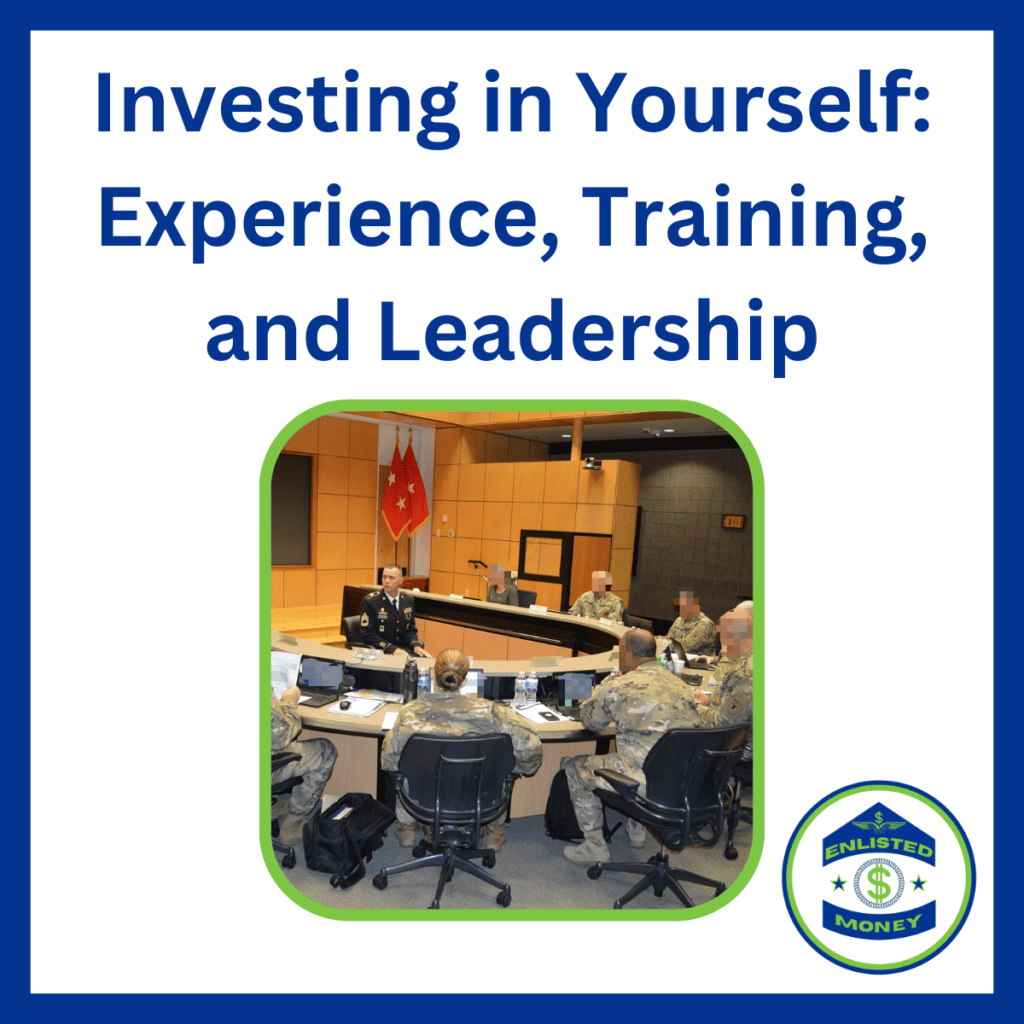
I was 24 years old and in charge of getting 52 souls safely to Afghanistan. There’s really no equivalent experience outside the military.
I had no clue what I was doing, but I figured it out. That’s really the most succinct way of summing up what we do in the military – Figure It the F*#$ Out. This, and so many other experiences we have in the military help us in ways you might never notice.
Investing Time in Unique Military Training and Certifications
If you’re not investing a significant portion of your time into getting better training, you’re wasting your time. I hear Soldiers all the time complain about getting more training, yet when we ask them to submit a packet… crickets. Nobody is going to force you to do extra training unless the unit needs you to have the training.
My “hack” for this is to look at all the additional duties that require training and start volunteering for them. Those positions and training get priority placement and funding. Do your research, find training that doesn’t require expensive TDY/TAD.
Also, if you’re just thrown into a position that requires training, keep demanding you get that training. Get your training packet filled out and submitted. Make them tell you no.
Developing Your Leadership and Management Skills
The military is one of the few places with such a high emphasis on leadership. We also have lots of formal and informal courses designed to teach leadership (some better than others). Getting good at leading is a valuable skill no matter where you are.
If you can volunteer to lead a project, do it. If you can get into some unique leadership training, take the spot. You’ll never regret being a better leader.
Investing in Unique Leadership Opportunities
The number one thing I’ve learned about leadership is this: make following your guidance as easy as possible. As the leader, make the path of least resistance the direction you want to take the team or organization. Build systems to teach and reinforce what it means to be successful.
If you ever find yourself pointing the blame on your subordinates, you’ve failed to set the right conditions and convey the importance of what you asked for. The moment I took ownership of my Soldiers’ actions, good or bad, we all became more successful.
Your Subordinates Don’t Expect You to Take the Blame
I remember having a relatively big issue and bringing all my NCOs in for a special meeting (I normally advise against this). I waited for everyone to get there and then led off by telling them that I failed and needed their help to figure out how to fix it.
I’ll never forget the shock on their faces or what many of them expressed later. They thought for sure I was going to “drop the hammer” or something. We did figure it out. I wasn’t perfect but getting them to drop their guard and engage in solving the issue, not passing blame, made a huge difference.
A Note on Servant Leadership
Also, servant leadership doesn’t mean you’re a doormat. It means actually taking care of the people. Give them the tools, resources, and guidance they need, then get out of the way. If you’re asking them to fix an issue at work, you’d better be hounding finance to get every single pay issue fixed. If not, you’re missing an opportunity as a leader.
I always tell my junior NCOs that their Soldiers should know they care without them ever having to say it. Actually, I think when leaders say they care, many enlisted service members just roll their eyes. We’ve heard it so many times from leaders that just didn’t get it. The video has to match the audio.
“Nobody cares how much you know until they know how much you care.”
– President Theodore Roosevelt
Take the Tough Assignments While Maintaining Relationships
I think it’s super important to take assignments based on skills you want to learn and the person you want to become – not just location. One caveat, I think it’s a mistake to take an assignment away from your family if you don’t have to. I’ve seen this go poorly many times.
I value my relationship with my wife and son above all else. When you exit service (we all do), the relationship with your family is all you’ll have left.
I asked for Drill Sergeant but was assigned as a Recruiter instead. After asking repeatedly to be assigned as an Inspector General, I eventually got it. I stepped up when I had the chance to be a First Sergeant. All of these assignments have helped me develop skills, connections, and a reputation for hard work and excellence. If I’d sat back and waited for whatever the Army threw at me, this might not be the case.
Recognize Opportunities When They Present Themselves
When I got DA-Selected (aka “voluntold”) to be a Recruiter, I thought I’d get to pick my next assignment. I did get to pick – between Kuwait or Korea. Some choice, right?
I chose Korea because I could take my family. We ended up having a great time. After being placed in a higher-level position, I was given a lot of autonomy (because of neglect, not because of their great leadership). There were two choices: hide out and do nothing like most of my predecessors or dig in and do my very best. I chose the latter – it made all the difference.
I was very fortunate to have a great team of Soldiers and NCOs. Many of whom only needed a little bit of encouragement and accountability to push themselves to be great. We turned the facility around and ended up earning a top award for the Pacific Region.
Anyone else before me (well, maybe not anybody, but I’m not that amazing either) could have done this, but they never tried. They took the easy way out. There are opportunities like this waiting for you too. You just have to recognize where the opportunities are and try.
Work a Grade Above
I have very rarely been in a position at my actual pay grade. I’ve almost always worked a step above. You could argue I’ve just been underpaid for the work I’ve done most of my career (no disagreement there), but I saw these assignments as opportunities to learn and grow.
Don’t sit back and say, well I wasn’t trained for this or I’m not getting paid for this. See it as an opportunity to prove yourself and grow. You’ll be building skills and evaluations which will accelerate your ability to get promoted. Just make sure you’re capturing everything on your evaluations, so you get proper credit.
The Value of Mentorship and Continuous Learning
The one thing I’ve gotten wrong in the military is not seeking out and cultivating mentors. I’ve spent a lot of time grinding things out on my own. This was partly due to having a lack of people I wanted to emulate, but I could have been more deliberate about reaching out to the few who I thought were good leaders. However, as I work toward my next phase of life in the financial services industry, I’ve sought out mentorship and it’s paying huge dividends.
I’ve gotten a ton of help, encouragement, and opportunities from mentors I’ve sought out in the last few years. I just looked for people doing something similar to what I wanted to do, then I asked as many great questions as a I could.
The military and veteran personal finance community is truly amazing in how much everyone gives and supports each other! I’ve been given lots of time, unique opportunities, and been gifted courses to help me in my business.
Actually, one of the coolest things is being selected as the MilMoneyCon Ambassador. As a result, I’m going to FinCon ’23 in New Orleans for free! How cool is that?
Make Your Time in Service Count
At the end of the day, I hope what you take from my barely coherent rambling is this: make every assignment, every opportunity, every second count. We never know exactly what’s coming next, but if we seize every opportunity we’re afforded in service, we’ll never regret it.
All the experiences, skills, and education you gain while in service compound to help create the best version of you possible. I feel like the military is a catalyst for the qualities that already exist in you. Make sure to use this “compression of time and experience” to your advantage. If you don’t leave service better than when you started, it’s because you didn’t seize all the opportunities afforded to you.
It’s not easy, but it’s worth it. I’ll leave you with something I’ve told myself over and over to get through the years in service: If you give 100%, nobody can ever take that away from you.
